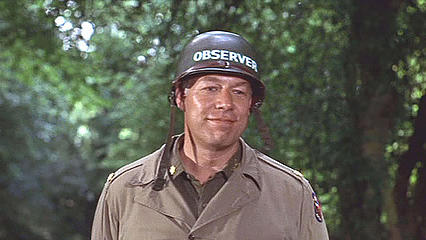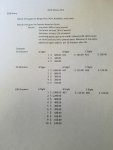If anyone was listening to the Everyday Sniper Podcast this week, I had a discussion regarding matches and range officers with Caylen.
Now quickly, I am not sure what Caylens' plan is for his match when he says, no traditional range officers as we have seen in the past. On this subject, I agree, and over the last year or so I have been thinking about this quite a bit. I see a bunch of matches that either run short on Range Officers, need a metric ton of them or just plain fall down in this area.
It sounds to me Caylen was talking support staff, and I get that, moving around making sure things run right.
Me, I was thinking more of "Officials" as we had in war games during my USMC Days. Think Dirty Dozen and George Kennedy when he was the Observer...

These "Officials" would be your referee during the war games. Like George did during the Capture the Flag game in the Dirty Dozen.
The biggest issue I see is scalability for these events to have the right number of range officers. The current model is one to two ROs at a stage to both Spot and as a Scorekeeper. It sort of pre-establishes the number of range officers and puts them in the mode of scorekeeper more than safety officer. Yet in a typical match, and I will use 100 shooters as a round number, you need at least 2 per stage, which can mean, 20 to 40+ range officers just to manage the event.
If we have a 100 shooters and use 10 squads as an example with 10 shooters each, that is 10 to 1 shooter vs Range Officers. So why not just embed an Observer in a squad? In fact this way, the day before you can actually Shoot the Range Officers in the event with the MD acting as an observer then have a few core guys who are match support follow the single squad to let them shoot the match also while learning the stage to answer any questions. There has to be an incentive, shooting the match you are working is one of those we can offer.
Most matches have booklets detailing the stage, the Observer can go over basic ground rules, and then "Observe" the squad shooting the stage before moving on. They only need a set of binos to verify, or just issue the squad a tripod and Spotter for use. For the most part, he stays out of glass and watches the shooters. On the clock he watches of safety, off the clock he watches for scoring and rules. We have ten experienced guys who can spot and score, he just makes sure it's all above board.
You can even rotate them on two-day events to no one RO is with the same squad all weekend. The hard part would be the MD needs to set the squads up to separate some of the "Teams" so it's not all the same group in a single squad. A bit more variety in who is actually in the squad.
Resource wise, it's a lot less work, match wise it should move better, and you give them the power to Stage DQ shooters for issues. This is the most important part, enforcement has to move beyond a stern talking too, and don't get me wrong I am guilty of it too. Start taxing Points for rules violations. If you want to be NASCAR and you are missing a lug nut at the end of the event, you get taxed for a rules violation.
If you capped matches to 100 shooters and had no more than 10 stages a day, and 10 shooters per squad, that is 10 Range Officers to cover the same ground. You can then have wandering support for other issues, target repair, water replenish, etc. It beats trying to do too much with too many people or too few Range Officers. It becomes a scalable program that can then move beyond the 4 corners of the series. With the number of matches per weekend spread across the country, scalability is the issue. As well this opens up the door to actually do more.
The current model was never scaled, it's the same as what we did in 2003, and 2011, prior to the PRS. The only difference is bigger numbers, more drama and a lot more resources necessary. It's consistent and can be replicated regardless of the layout of the range. It's adaptable, want more shooters, you can still make a squad bigger, or just add a stage and attach a squad too it.
It's not so much self-scoring as squad-based scoring and spotting. You just have an official overseeing it. We have 10 guys in a squad doing nothing but watching either the Shooter or ROs, and then complaining about missed hits or other issues. If you have an official right there he can rule on the spot, and he is not ruling against himself, did that hit, "Never heard it" the Spotter didn't see it, and no-hit was called, I agree" or even, yes I heard it hit, give him the point. Safety can be looked at during transitions because the Official is not watching the steel, he can watch the shooter.
Enforcement again is key, if someone or some squad is caught playing fast and loose with the rules, even a single point fudge should be a 1 year ban from sanctioned competition. End of story, you got caught, you're banned. Sure you can shoot a match, but don't let their score count for anything. You are paying for nothing until the ban is over.
I think using Officials vs Range Officers can solve a lot of issues moving forward, especially considering the number of matches across the US. Plus it helps to have a consistent look across the field. Then. you know what to expect.
Now quickly, I am not sure what Caylens' plan is for his match when he says, no traditional range officers as we have seen in the past. On this subject, I agree, and over the last year or so I have been thinking about this quite a bit. I see a bunch of matches that either run short on Range Officers, need a metric ton of them or just plain fall down in this area.
It sounds to me Caylen was talking support staff, and I get that, moving around making sure things run right.
Me, I was thinking more of "Officials" as we had in war games during my USMC Days. Think Dirty Dozen and George Kennedy when he was the Observer...

These "Officials" would be your referee during the war games. Like George did during the Capture the Flag game in the Dirty Dozen.
The biggest issue I see is scalability for these events to have the right number of range officers. The current model is one to two ROs at a stage to both Spot and as a Scorekeeper. It sort of pre-establishes the number of range officers and puts them in the mode of scorekeeper more than safety officer. Yet in a typical match, and I will use 100 shooters as a round number, you need at least 2 per stage, which can mean, 20 to 40+ range officers just to manage the event.
If we have a 100 shooters and use 10 squads as an example with 10 shooters each, that is 10 to 1 shooter vs Range Officers. So why not just embed an Observer in a squad? In fact this way, the day before you can actually Shoot the Range Officers in the event with the MD acting as an observer then have a few core guys who are match support follow the single squad to let them shoot the match also while learning the stage to answer any questions. There has to be an incentive, shooting the match you are working is one of those we can offer.
Most matches have booklets detailing the stage, the Observer can go over basic ground rules, and then "Observe" the squad shooting the stage before moving on. They only need a set of binos to verify, or just issue the squad a tripod and Spotter for use. For the most part, he stays out of glass and watches the shooters. On the clock he watches of safety, off the clock he watches for scoring and rules. We have ten experienced guys who can spot and score, he just makes sure it's all above board.
You can even rotate them on two-day events to no one RO is with the same squad all weekend. The hard part would be the MD needs to set the squads up to separate some of the "Teams" so it's not all the same group in a single squad. A bit more variety in who is actually in the squad.
Resource wise, it's a lot less work, match wise it should move better, and you give them the power to Stage DQ shooters for issues. This is the most important part, enforcement has to move beyond a stern talking too, and don't get me wrong I am guilty of it too. Start taxing Points for rules violations. If you want to be NASCAR and you are missing a lug nut at the end of the event, you get taxed for a rules violation.
If you capped matches to 100 shooters and had no more than 10 stages a day, and 10 shooters per squad, that is 10 Range Officers to cover the same ground. You can then have wandering support for other issues, target repair, water replenish, etc. It beats trying to do too much with too many people or too few Range Officers. It becomes a scalable program that can then move beyond the 4 corners of the series. With the number of matches per weekend spread across the country, scalability is the issue. As well this opens up the door to actually do more.
The current model was never scaled, it's the same as what we did in 2003, and 2011, prior to the PRS. The only difference is bigger numbers, more drama and a lot more resources necessary. It's consistent and can be replicated regardless of the layout of the range. It's adaptable, want more shooters, you can still make a squad bigger, or just add a stage and attach a squad too it.
It's not so much self-scoring as squad-based scoring and spotting. You just have an official overseeing it. We have 10 guys in a squad doing nothing but watching either the Shooter or ROs, and then complaining about missed hits or other issues. If you have an official right there he can rule on the spot, and he is not ruling against himself, did that hit, "Never heard it" the Spotter didn't see it, and no-hit was called, I agree" or even, yes I heard it hit, give him the point. Safety can be looked at during transitions because the Official is not watching the steel, he can watch the shooter.
Enforcement again is key, if someone or some squad is caught playing fast and loose with the rules, even a single point fudge should be a 1 year ban from sanctioned competition. End of story, you got caught, you're banned. Sure you can shoot a match, but don't let their score count for anything. You are paying for nothing until the ban is over.
I think using Officials vs Range Officers can solve a lot of issues moving forward, especially considering the number of matches across the US. Plus it helps to have a consistent look across the field. Then. you know what to expect.
Last edited:


